
15 minute read
TOP PLACES TO SEE IN FLORENCE
Museums, churches and all the a ractions that you should not miss in city. Reservations are recommended in some museums, ask your ‘Les Clefs D’Or’ concierge
Museums
1 UFFIZI GALLERIES

Florence’s museum complex consisting of the Uffizi Gallery, the Vasari Corridor, Palazzo Pi i and the Boboli Gardens. The Uffizi Gallery is one of the world’s greatest museums, built in 1560 by Cosimo I de’ Medici, and houses works by the greatest Renaissance artists, from Bo icelli to Leonardo da Vinci, from Michelangelo to Raphael and Titian.
Piazzale degli Uffizi, 6 ph. +39 055 294883 uffizi.it
Closed on Monday
2 PALAZZO PITTI
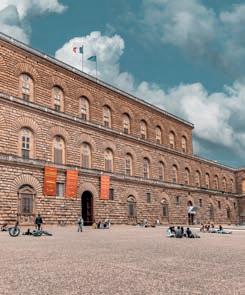
The royal residence of three families: the Medicis, the
Habsburg-Lorraines and the Savoias. Palazzo Pi i is still named a er its first owner, the Florentine banker Luca Pi i. It currently houses some of the city’s most important museums: the Palatine Gallery with masterworks by Raphael, Titian, Tintore o, Caravaggio and Rubens, the Imperial and Royal Apartments on the Palazzo’s main floors (now temporarily closed), the Modern Art Gallery featuring works by Macchiaolo painters, the Treasury of the Grand Dukes, the Fashion and Costume Museum (now temporarily closed), the Porcelain Museum, the Carriages Museum and the new Museum of Russian Icons. The Palace is completed by the Boboli Garden.
Piazza de’ Pi i, 1 ph. +39 055 294883 uffizi.it
Closed on Monday
3 PALAZZO
Vecchio
Designed in 1299 by Arnolfo di Cambio as Palazzo della
Signoria and later enlarged by Vasari as the Medici family’s residence. Among the must-see sixteenth-century rooms are the grand Salone dei Cinquecento, Francesco I’s small secret study, the Hall of the Lilies and the Hall of Geographical Maps. The Palace is crowned by the Tower of Arnolfo.
Piazza della Signoria ph. +39 055 2768224 cultura.comune.fi.it
4
Opera Del Duomo Museum
A journey through the places and artists who created the monumental Opera complex, the cradle of the Renaissance, and today one of the world’s most important museums. Its showcases the original works of art that de- corated the city’s monuments over seven centuries: from Michelangelo to Donatello, Brunelleschi, Ghiberti and many more.
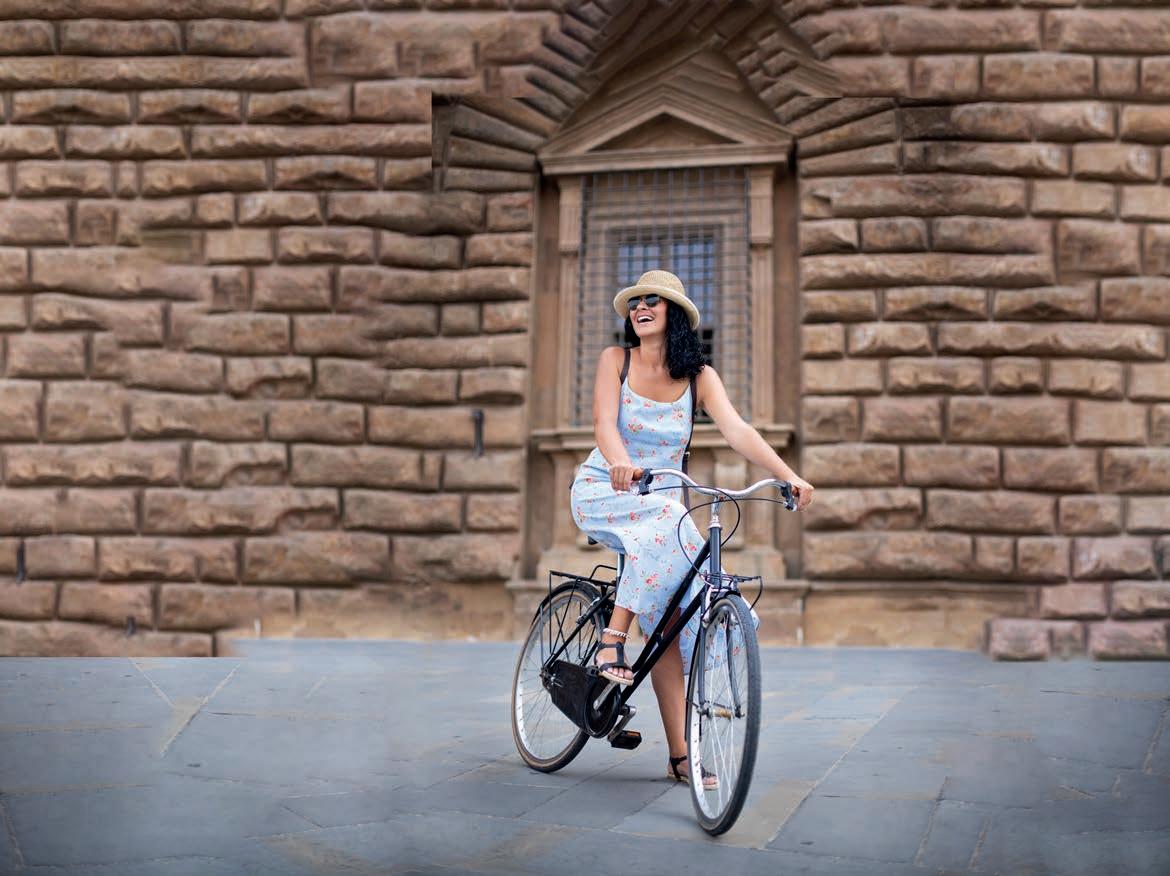



Piazza del Duomo, 9 ph. +39 055 2302885 duomo.firenze.it
Closed every first Tuesday of the month
5
GALLERIA DELL’ACCADEMIA
It is also known as ‘Michelangelo’s Museum’, because it showcases most of the statues by the famous artist, first of all, the David, but also the Prigioni, St. Ma hew and the Palestrina Pietà. Other masterworks are the Rape of the Sabine Women by Giambologna and Bo icelli’s Madonna with Child and Madonna of the Sea.

Via Ricasoli, 58/60 ph. +39 055 294883 galleriaaccademiafirenze.it
Closed on Monday
6 PALAZZO
Strozzi
A masterwork of Renaissance architecture and a lively cultural center of international standing, which every year houses exhibitions ranging from ancient to modern and contemporary art.

Piazza Strozzi ph. +39 055 2645155 palazzostrozzi.org
7 Museo Nazionale Del Bargello

Once the city’s main prison, in 1865 the building was con- verted into a museum which today showcases major works of art by Michelangelo, Donatello, Verrocchio, Giambologna, Brunelleschi and much more.
Via del Proconsolo, 4 ph. +39 055 0649440 bargellomusei.beniculturali.it Closed on Tuesdays and on the 2nd and 4th Sunday of the month
8 MEDICI CHAPELS
They are part of the complex of the Church of San Lorenzo and consist of Michelangelo’s New Sacristy, Buontalenti’s Chapel of the Princes and the two crypts with the tombs of the Medici and Lorraine family members.

Piazza di Madonna degli Aldobrandini, 6 ph. +39 055 0649430 bargellomusei.beniculturali.it Closed on Tuesdays and on the 1st, 3rd and 5th Sunday of the month
9 Museo Di San Marco
It was Savonarola’s home and in addition to the exhibition halls, you can also visit the cells containing frescoes by Beato Angelico, who was also a monk here.
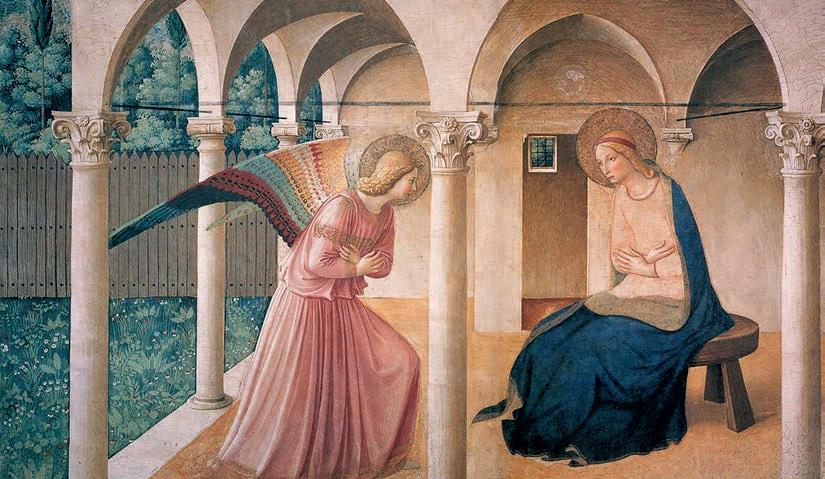

Piazza San Marco, 3 ph. +39 055 0882000 polomusealetoscana.beniculturali.it
Closed on the 1st , 3rd and 5th
Sunday of the month, on Mondays following the open Sunday
10 PALAZZO
Medici Riccardi
Designed by Michelozzo, the Palace houses the Magi Chapel with the famous frescoes of the Journey of the Magi by Benozzo Gozzoli.
Via Cavour, 3 ph. +39 055 2760552 palazzomediciriccardi.it
Closed on Wednesdays
Stefano Bardini Museum
11
The collection of the most important Italian antiquarian. From the Romans to the 18th century.
Via dei Renai, 37 ph. +39 055 2342427 cultura.comune.fi.it
Closed on Tuesdays, Wednesdays and Thursdays
12 STIBBERT MUSEUM
A historic house museum featuring an extensive collection of arms, armors, costumes and objects of various ages and origin, collected by Frederick Stibbert throughout his life.
Via Federigo Stibbert, 26 ph. +39 055 475520 museostibbert.it

Closed on Thursdays
13 CASA DI DANTE
Museum
The museum aims to make Dante and the everyday life

A Taste To Savour
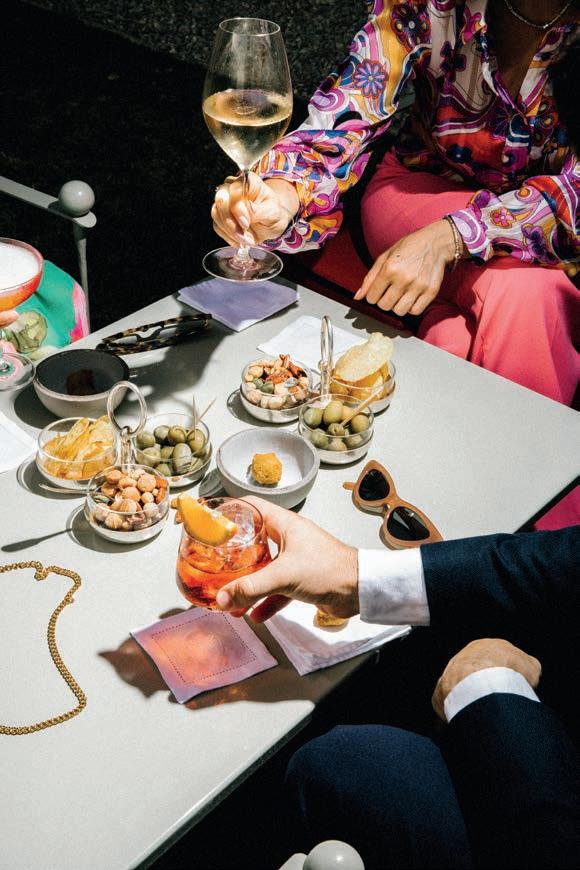
ENJOY SOPHISTICATED CONVIVIALITY IMMERSED IN OUR LUSH CASCADING GARDENS WITH SPELLBINDING VIEWS OF FLORENCE
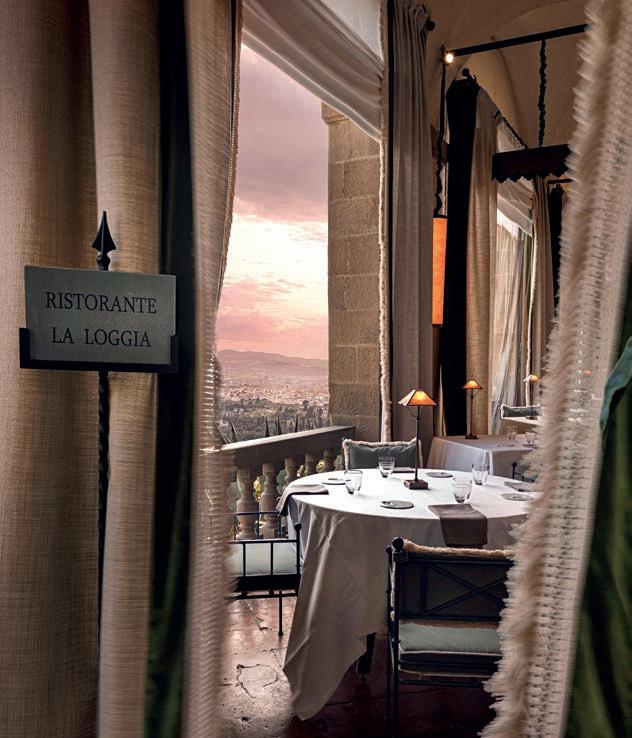

FOR RESERVATIONS:
T. +39 055 5678 200
CONCIERGE.VSM@BELMOND.COM in medieval Florence be er known to the public. The various rooms showcase replicas of objects and clothing commonly used in the 1300s.


Via Santa Margherita, 1 ph. +39 055 219416 museocasadidante.it
Closed on Mondays
14 MUSEO NOVECENTO
The museum is devoted to 20th and 21st-century Italian art. In addition to a permanent collection, it houses temporary exhibitions, installations and special projects.
Piazza Santa Maria Novella, 10 ph. +39 0552768224 museonovecento.it
Closed on Thursdays
15 INNOCENTI MUSEUM
The museum illustrates the past and present of the Innocenti Institute, commi ed to the promotion of children’s rights for six centuries, through art and history.
Piazza della SS. Annunziata, 13 ph. +39 055 2037122 museodeglinnocenti.it
Closed on Tuesdays
16 SALVATORE FERRAGAMO MUSEUM

Established in May 1995 by the Ferragamo family for the purpose of making Ferragamo’s role in the history of footwear and international fashion better known.
Palazzo Spini Feroni Piazza Santa Trinita, 5/r ph. +39 055 3562846 +39 055 3562466 ferragamo.com/museo/it
17 CASA BUONARROTI

The museum is devoted to the memory and celebration of Michelangelo’s genius through drawings, paintings and sculptures.
Via Ghibellina, 70 ph. +39 055 241752 casabuonarroti.it
Closed on Tuesdays and Easter holidays
18 GUCCI MUSEUM
The museum illustrates the fashion house’s 90-year history. From Gucci’s origins to its most iconic models that have become must-haves all over the world, to the logo’s history.
Piazza della Signoria, 10 ph. +39 055 75927010 gucci.com/it


19 National Archaeological Museum Of Florence
The museum showcases finds from excavations all over Tuscany, very precious Etruscan and Roman finds, and collections related to other civilizations.
Piazza SS. Annunziata, 9b ph. +39 055 23575 polomusealetoscana.beniculturali.it
Closed on the 2nd , 3rd , 4th and 5th Sunday of the month
20 FRANCO ZEFFIRELLI
Museum
The museum is part of the Zeffirelli Foundation and Monumental Complex of San Firenze. It showcases over 250 works by Maestro Zeffirelli, including stage sketches, drawings and costume plates, playbills and studies.

Piazza San Firenze, 5 ph. +39 055 2658435 fondazionefrancozeffirelli.com
Closed on Mondays
21 HORNE MUSEUM
Established by the bequest of Herbert Percy Horne, the museum reconstructs the rooms of a typical old Florentine house, with 14th and 15th-cen- tury antiques, sculptures and paintings.


Via dei Benci, 6 ph. + 39 055 244661 museohorne.it
Churches
22 OPERA DI SANTA
MARIA DEL FIORE
Complex
The Cathedral of Santa Maria del Fiore was designed by Arnolfo di Cambio in 1296 and it is the world’s third largest church a er St. Peter’s in Rome and St. Paul’s in London. In 1412, it was dedicated to Santa Maria del Fiore with a clear reference to the lily, the city’s symbol (closed on Sundays). The Dome was designed by Brunelleschi many years later, in 1420, and decorated by Giorgio Vasari and Federico Zuccari. It is a masterwork of art and to this day the largest masonry dome ever built, surrounded by outdoor terraces open to visitors. Opposite the Cathedral is the Baptistery of San Giovanni, accessed through three doors, the most important of which is the Gate of Paradise, located on the main façade. Gio o’s bell tower, 84,7 meters high and about 15 meters wide, is one of the most important examples of 14th-century Florentine Gothic art. Do not miss the Opera del Duomo Museum.

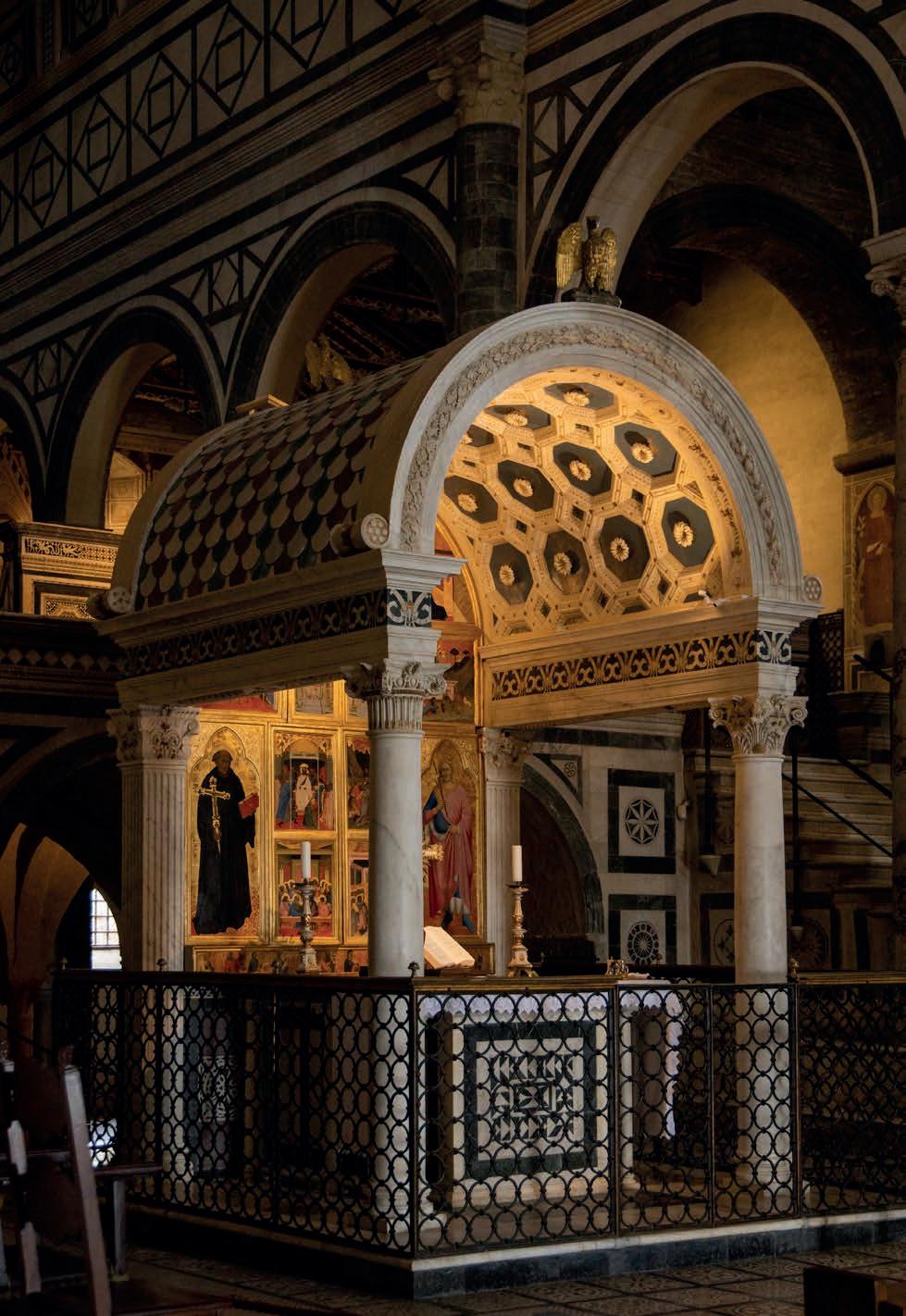
Piazza del Duomo ph. +39 055 2645789 duomo.firenze.it
23 COMPLEX OF SANTA CROCE
It houses several frescoes by Gio o, the Crucifix by Cimabue, works by Donatello and Orcagna.
Piazza Santa Croce, 16 ph. +39 055 2466105 santacroceopera.it
24 BASILICA OF SANTO SPIRITO
Designed by Filippo Brunelleschi, it houses works by the greatest Florentine artists, including the wooden Crucifix, an early work by Michelangelo.

Piazza di Santo Spirito, 30 ph. +39 055 210030 basilicasantospirito.it
Closed on Wednesdays
25 MONUMENTAL
Complex Of Santa Maria Novella
The Basilica of Santa Maria Novella houses The Holy Trinity by Masaccio, the Crucifix by Giotto and Brunelleschi, frescoes by Ghirlandaio and Bo icelli. Do not miss the Green Cloister with frescoes by Paolo Uccello.
Piazza Santa Maria Novella, 18 ph. +39 055 219257 smn.it
26 COMPLEX OF SAN LORENZO
It includes the Basilica, the Laurentian Library and the magnificent cloister and houses many artistic treasures, such as works by Donatello, Bronzino, Filippo Lippi, Michelangelo and Brunelleschi. Piazza San Lorenzo, 9 ph. +39 055 214042 operamedicealaurenziana.org
27 CHURCH OF SANTA
Maria Del Carmine And Brancacci Chapel
In the heart of the Oltrarno neighborhood, the Carmelite Church and Convent of Santa Maria del Carmine houses the Brancacci Chapel and the famous frescoes by Masaccio,

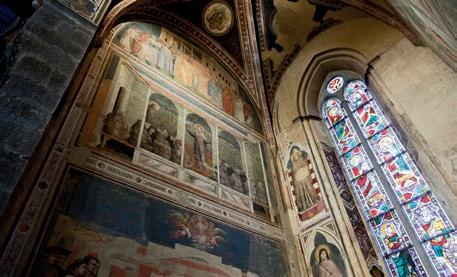
Masolino and Filippino Lippi.
One of the city’s major landmarks since the 13th century.
Piazza del Carmine ph. +39 055 2768224 cultura.comune.fi.it
Closed on Tuesdays, Wednesdays and Thursdays
28 BASILICA OF SAN-
Tissima Annunziata
A place rich in art, devotion and local history. Florence’s main Marian sanctuary, the mother church of the Servite Order. The church is located on the piazza by the same name, next to the Spedale degli Innocenti.
Piazza della SS. Annunziata ph. +39 055 266181 annunziata.xoom.it
29 Church Of Orsanmichele
Originally a grain market, in the mid-1300s the building was consecrated to Chris- tian worship. It now contains sculptures by Donatello and Ghiberti and a beautiful marble Tabernacle dedicated to the Madonna delle Grazie. Via dell’Arte della Lana ph. +39 055 0649450 bargellomusei.beniculturali.it Open only on Tuesday mornings and Saturday a ernoons

30
Abbey Of San
Miniato Al Monte
Built between the 11th and 13th centuries, the church is a masterwork of the Florentine Romanesque style. The façade is in green and white marble, the interior houses precious works such as the Crucifix Chapel by Michelozzo with glazed earthenware vaulting by Luca della Robbia.
Via delle Porte Sante, 34 ph. +39 055 2342731 sanminiatoalmonte.it
31 Basilica Of Santa Trinita
One of the first Gothic churches in Florence. The façade was rebuilt in the 1500s by Bernardo Buontalenti, the Sasse i Chapel is a work by Ghirlandaio.
Piazza di Santa Trinita

32
Church Of Ognissanti
Located on Piazza Ognissanti, the Church was built in 1251 and belonged to the conventual complex of the Umiliati order, replaced with the Franciscan order in 1571. Not to be missed Gio o’s Crucifix and
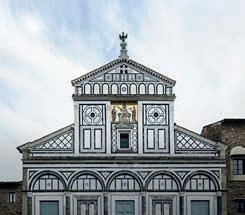

Bo icelli’s Tomb.
Borgo Ognissanti, 42 ph. +39 375 5652013 chiesaognissanti.it
Closed on Wednesdays
33 Jewish Synagogue And Museum
Established in 1882 in the Ma onaia neighborhood, the Synagogue is the heart of the local Jewish community and an integral part of the city’s history. The museum showcases a rich collection of Jewish artistic ritual objects. Via Luigi Carlo Farini, 6 ph. +39 0552989879 jewishflorence.it
Closed on Saturdays TOP ATTRACTIONS
34 PONTE VECCHIO
Built in 1345, it is Europe’s oldest stone bridge. Once lined with butcher’s shops, today Ponte Vecchio is home to the city’s luxury jewelry boutiques. The Vasari Corridor, which connects Palazzo Vecchio and Palazzo Pi i, runs above it. During World War Two, it was the only bridge in Florence that was not destroyed by the Germans.

35 LOGGIA DEI LANZI
The monument located on
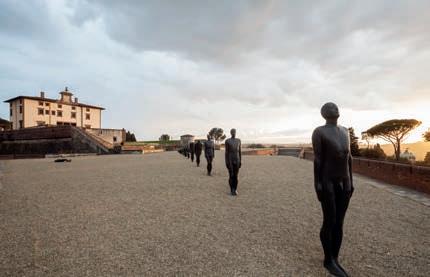
Piazza della Signoria to the right of Palazzo Vecchio and next to the Uffizi Gallery, which adjoins it at the back with a terrace at the top of the Loggia dei Lanzi. It is also known as Loggia dei Priori or dell’Orcagna and houses precious works of art such as the Perseus by Benvenuto Cellini, The Rape of the Sabine Women and the Hercules and Nessus by Giambologna.
Piazza della Signoria


36 SHOPPING
The best-known fashion houses have their boutiques and shops on Via de’ Tornabuoni and Via della Vigna. The other shopping streets are located just a few meters away from the city’s main attractions. And so, by walking from the Duomo to Piazza della Signoria, you will be able to browse and shop at the many stores along Via Calzaiuoli and Via del Corso. Be sure to visit the Ponte Vecchio lined with sparkling jewelry shops.
37 Craft Shops
It is the other side of Florence, the traditional one, oozing with the creativity and colors of cra shops. It is Florence’s Oltrarno, the neighborhood of old arts and cra s. The San Frediano, San Niccolò and Santo Spirito areas are filled with goldsmith’s workshops that work and assemble gemstones to create unique and extraordinary jewels.

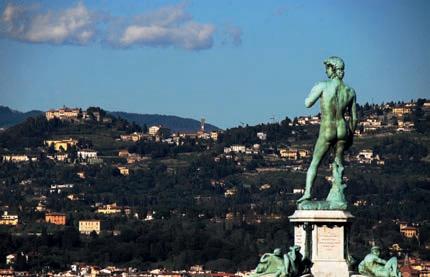
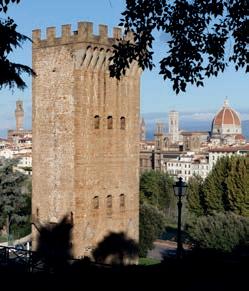
38
Antique Shops
Via Maggio and Via dei Fossi are the streets where the ancient techniques of etching, metalworking and furniture and frame gilding are still performed. Workshops that a ract customers from all over the world and keep the tradition of po ery, wood carving and decoration alive.
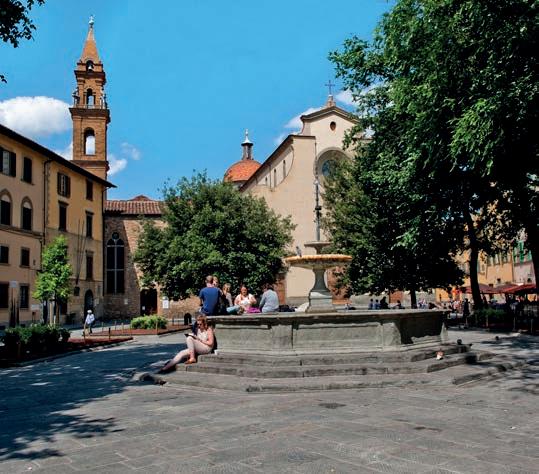
39 Forte Belvedere
Besides being one of the city’s most panoramic locations, it is an architectural work designed in the late 1500s by Bernardo Buontalenti for Ferdinando I de’ Medici. It is the Vasari Corridor’s final stretch and it has been housing international contemporary art exhibitions since 2013.
Via di S. Leonardo, 1 ph. +39 055 2768224 musefirenze.it
Open from June to October, closed on Mondays
40 LOGGIA
Loggia del Porcellino is the common name for Florence’s Loggia del Mercato Nuovo, so called to distinguish it from the Mercato Vecchio, which was located in the area of today’s Piazza della Repubblica. The Loggia’s focal point has been, since 1640, the Fontana del Porcellino ( the piglet fountain), actually a replica of the seventeenth-century bronze wild boar by Pietro Tacca currently showcased at the Stefano Bardini Museum.
SQUARES & TOWERS
22
Piazza Del Duomo
The heart of the city where you can admire all together the Cathedral of Santa Maria del Fiore, Brunelleschi’s dome, Gio o’s bell tower and the Baptistery of San Giovanni.
2 PIAZZA
Pitti
Nearly completely dominated by the imposing Palazzo Pi i, it is one of the major piazzas of the Oltrarno neighborhood.

the Cardus and Decumanus, intersected. Today some of the city’s most popular cafés are located on the piazza.
42 PIAZZALE
Michelangelo
3
Piazza Della Signoria
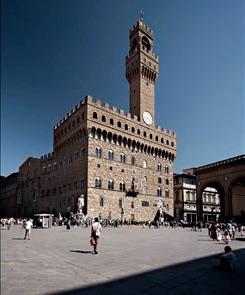
The square’s current design dates back to the 13th century and it was paved in the late 14th century. It has always been the symbol of the city’s civil power. Its most iconic building is Palazzo Vecchio, with a replica of Michelangelo’s David at the entrance and next to the Loggia dei Lanzi. In the middle of the piazza is the Fountain of Neptune, also known as the Biancone, with its central statue designed by Bartolomeo Ammannati.


Piazza Della Repubblica
41
The heart of the city since ancient Roman times. Rising in the middle of the square is the Column of Abundance, which marks the point where the main ancient Roman roads,
Designed by architect Giuseppe Poggi. Standing in the middle of the square are the Monument to Michelangelo, composed of the bronze replicas of the four sermons preached by the Carmelites, who owned the Basilica of Santa Maria del Carmine facing the piazza.
43 PIAZZA
San Firenze

The square was named a er the complex of San Filippo Neri, also known as San Firenze due to the mispronouncing of the name of a pre-existing building dedicated to San Fiorenzo.
44 Tower Of San Niccol
allegories of the San Lorenzo Medici Chapels, and the imposing David, the original statue being kept at the Accademia Gallery.
Spirito
23
Piazza Santa Croce
It owes its name to the basilica, one of Italy’s largest Franciscan churches. Located in front of the basilica is the monument to Dante Alighieri by Enrico Pazzi.
24
Crowded with market stalls, tourists and art students during the day, Piazza Santo Spirito is one of the focal points of the city’s nightlife. Standing on one side of the piazza is the monument to Cosimo Ridolfi.
27 PIAZZA
Del Carmine
This square was built to allow the crowds to hear the
The name derives from the nearby neighborhood of San Niccolò, and it was built in 1324 probably to the design of Orcagna, while the last circle of walls was being erected. It is the only Florentine gate which has preserved its original height.
aperturaGARDENS & PARKS
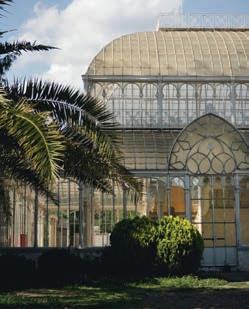

45
Boboli Gardens

The Boboli Gardens spreads out at the back of Palazzo Pi i. The Medici family planned the garden’s layout by creating the model for the Italian garden. An open-air museum, filled with statues, gro os (including the one designed by Buontalenti) and large fountains, such as the Neptune and Ocean fountains.
Piazza de’ Pi i, 1 ph. +39 055 294883 u
Closed on the first and last Mon- day of the month, except from June to October

46
Bardini Garden
On one side the beautiful Baroque staircase, the English wood and the agricultural park where a wonderful wisteria pergola blooms in spring; on the other, the villa built in the 1600s by architect Gherardo Silvani, also called Villa Belvedere because of its wonderful panoramic position, and later enlarged by Stefano Bardini.
Via dei Bardi, 1r and Costa San Giorgio, 2 ph. +39 055 2638599 +39 055 2346988 villabardini.it

Villa closed on Mondays, garden closed on the first and last Monday of the month
47
Rose Garden
Located beneath Piazzale Michelangelo, the Rose Garden features over 350 varieties of roses which bloom from May to June and 12 sculptures by Belgian architect Jean-Michel Folon.
Viale Giuseppe Poggi, 2

48 HORTICULTURE
Garden
A nineteenth-century garden, the home to national floriculture shows, with a Renaissance loggia and an Art-Nouveau tepidarium. The highest point is accessed from Via Trento through the Orti del Parnaso, also called “del Dragone” because of the odd dragon-shaped fountain winding up the staircase.
Via Vi orio Emanuele II
49
Cascine Park
Established as a Medicean farm in 1563 by Cosimo I, with the Lorraine family the Cascine Park became a place of entertainment and Sunday outings. Do not miss the equestrian statue to Vi orio Emanuele II, the Pegasus Col- umn, the Pyramid and the Indian Monument.



Piazzale delle Cascine
50
Medicean Park Of Pratolino
Villa Demidoff was demolished in 1822, while the park still remains open to visitors and features the Apennine Colossus by Giambologna and the Cupid’s Cave by Buontalenti.
Via Fiorentina, 276 ph. +39 349 8800380
Open from April to September
51 Villa Gamberaia Gardens
The beautiful garden of Villa Gamberaia, in Se ignano, spreads over several levels, where one can admire the lemon-house, a niche decorated with pebble mosaics and a spectacular modern parterre

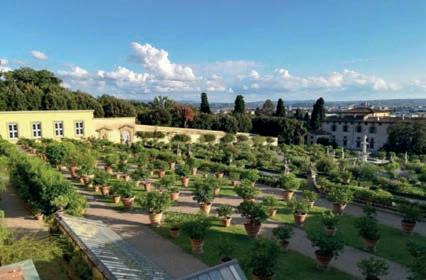


Via del Rossellino, 72 ph. +39 347 2386326 villagamberaia.com
Medici Villas
52 Medici Villa La Petraia
An ancient fortress whose tower still stands, belonging first to the Brunelleschi family and later to the Strozzis, La Petraia was bequeathed by Cosimo I de Medici to his son, the cardinal Ferdinando, in 1568 and later converted into an elegant Renaissance residence. The villa is surrounded by a large English-style park.
Via della Petraia, 40 tel. +39 055 452691 villegiardinimedicei.it
Closed Mondays
53 MEDICI VILLA OF CASTELLO
One of the oldest country residences of the Medici family, who acquired it in 1477. The villa was listed as a UNESCO World Heritage Site in 2013, and is currently home to the Accademia della Crusca; the garden is a prototype of 16th-century Italian design.
Via di Castello, 44 tel. +39 055 452691 villegiardinimedicei.it
Temporarily closed
54 MEDICI VILLA
Of Poggio A Caiano
Designed by Giuliano da Sangallo for Lorenzo the
Magnificent, as an example of Renaissance architecture. The splendid Sala di Leone X on the piano nobile is astonishing; the second floor is devoted to the Still Life Museum, and the gardens outside are dominated by a 19th-century lemon house.
Piazza de’ Medici,14 tel. +39 055 877012 villegiardinimedicei.it Closed Mondays, Thursdays and the 1st, 4th and last Sunday of the month
55 MEDICI VILLA
La Ferdinanda
Built in 1596 on the orders of Grand Duke Ferdinando I de’ Medici and to a design by Bernardo Buontalenti, Villa La Ferdinanda is also known as the Villa of a Hundred Chimneys, for the numerous chimney pots that make the building unique.
Viale Papa Giovanni XXIII, 1 tel. +39 333/9418333 villegiardinimedicei.it Open subject to booking
56 MEDICI VILLA
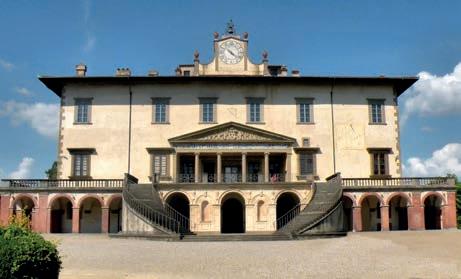
In Fiesole

The first example of a Renaissance villa, this became the inspiration for numerous other residences. A er the Medicis, the marquise Del Sera turned the western terrace into a loggia, while the lower terraced area was home to the vegetable garden, with aromatic plants for household use.


Via Beato Angelico, 2 villegiardinimedicei.it Garden may be visited by appointment


Markets 57 San Lorenzo Market
The historic San Lorenzo Market spreads over two floors. The ground floor is full of stalls selling food of all sorts, whereas the first floor houses restaurants, pizzerias, shops and tables where you can sit down and eat. The streets sur- rounding the building are lined with traditional artisan workshops, wine bars and osterias.
Piazza del Mercato Centrale and Via dell’Ariento mercatocentrale.it/firenze ph. Mercato Centrale
+39 055 265742
+39 055 2741150
58 SANT’AMBROGIO MARKET
The indoor Sant’Ambrogio market, built on the site of a large vegetable garden beyond Santa Croce towards the city walls, was inaugurated in 1873 and today houses grocery stores.

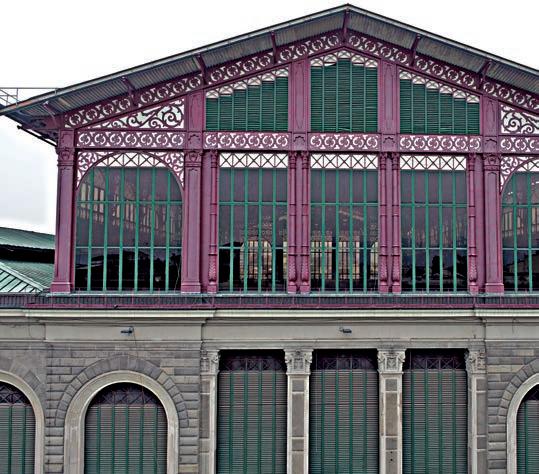
Piazza Lorenzo Ghiberti ph. +39 055 2480778 mercatosantambrogio.it

Closed on Sundays and public holidays
59 PORCELLINO
Market
It is commonly called Mercato Nuovo to distinguish it from the Mercato Vecchio, which was located in the area of today’s Piazza della Repubblica. The name Mercato del Porcellino comes from the statue of a wild boar that the Florentines call “porcellino” (piglet). It is covered by an old loggia which was designed by Giovanni Ba ista del Tasso and built in 1547.

Piazza del Mercato Nuovo mercatodelporcellino.it
60 FLEA MARKET
Until a few years ago, the market was located in the historic Piazza dei Ciompi. In 2019, it was moved to a permanent structure just steps away from the Sant’Ambrogio market. You can shop there for antiques, collectibles, paintings, books and second-hand items.
Largo Pietro Annigoni










